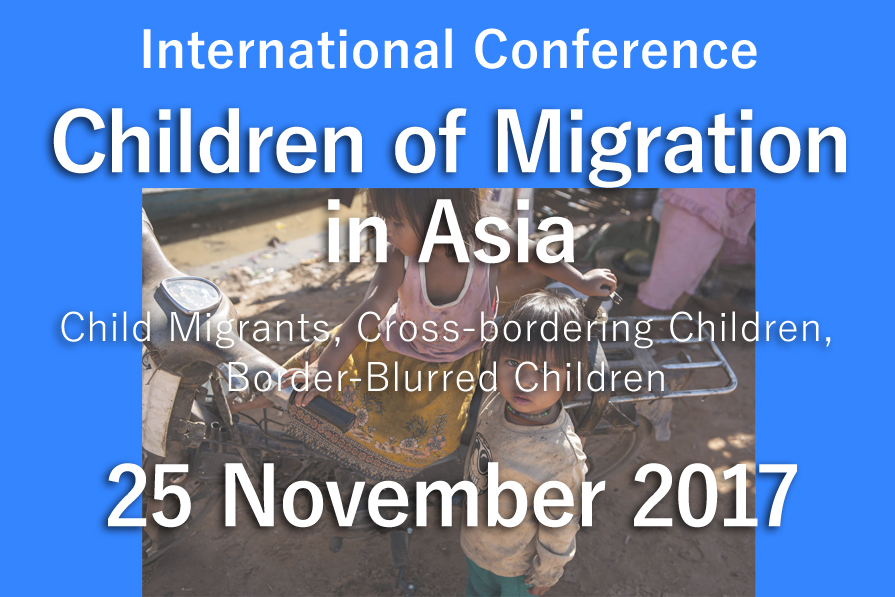IMPORTANT DATES
| 31 JULY 2017 | Deadline for abstract submission (Title, abstract (180-200 words), a brief bio with name and affiliation (100-150 words)) |
|---|---|
| 30 AUGUST 2017 | Notification of acceptance |
| 30 OCTOBER 2017 | Deadline for full papers (4,000–8,000 words) |
Both abstracts and full papers should be send to: info_children@rikkyo.ac.jp
| DATE | November 25, 2017, 9:30-18:00 |
|---|---|
| VENUE | Conference rooms 1 and 2, McKim Hall, Ikebukuro Campus,Rikkyo University, Tokyo |
| ORGANIZER | ILCAA/JSPS Research Project onChild Migration in Asia |
| KEYNOTE SPEAKERS | Professor Rhacel S. Parrenas (SouthernCalifornia University) and Professor Nicola Piper (Sydney University) |
CONFERENCE THEME
A great deal of sociological and anthropological research on migration has investigated second-generation migrants focusing mainly on identity, long-distance nationalism, citizenship. However, there are many populations around the world who share similarities with such people but cannot be explained as first- or second-generation migrants. They include people who experienced migration during childhood—people whose childhoods were built around (repeated) migration experience(s). Moreover, many people today have not experienced physical cross-border migration, but exposed to cross-border experiences in their daily life during their childhood. Such people include those raised in families with cross-border strategies either by foreign education or transnational business, those born of cross-border intimacy either formal marriage or not, children adopted across borders, the stepchildren of cross-border remarriages, and the children of cross-border divorces, among others. The point these people mutually share is (repeated) migration during childhood in terms of the diversity and complexity of their sense of affiliation, identity, language ability, social capital, social network, educational background, and sometimes nationality or citizenship status.
This conference focuses on how such complexities are entangled with each other and how those situations affect people’s social experiences especially when they enter higher education, enter the labor market, and start families.
The conference will be composed of three main sessions:
- the partial citizenship of family migrants,
- the ubiquitous borders experienced in daily lives, and
- the transnational class reflected in the life courses of border-crossing children.
Selected papers will be published as chapters in a monograph following revisions by referees. The monograph published from our project’s last conference is published in 2016.
WHO IS CHILD MIGRANTS/CROSS-BORDERING CHILDREN
In this conference, the term “child migrants”or “cross-bordering children” has a wider definition. This term includes people who experienced migration in their childhood, some even repeatedly. In addition, today, numerous people have not experienced physical cross-border migration, but they have experienced cross-border experiences in their childhood. Examples include children born out of cross-border marriages or intimacy without formal marriage registration, cross-border adoptions, stepchildren of cross-border remarriages, children of cross-border divorces, and so on. Such people also are in the same situation as those who experienced (repeated) migration in their childhood in the way that their senses of affiliation, identities, language abilities, social capital, social networks, educational backgrounds, and sometimes nationality or citizenship statuses are diverse and complicated.
TARGET AREA
In our project, the target area of research covers East and Southeast Asia – namely China, Japan, Korea, Mongolia, Taiwan, Hong Kong, Singapore, Philippines, Malaysia, Indonesia, Brunei, East Timer, Thailand, Laos, Cambodia, Vietnam, and Myanmar and extended migration from those area. While we acknowledge that cross-border migration phenomena cannot be enclosed within such a territorial boundary, we have set these regions as our target area to focus the research framework.
PRESENTATION THEMES
We welcome papers both based on qualitative and quantitative studies, on the following themes in the context of East and Southeast Asia (as well as cases extending from those regions), from political science, sociology, anthropology, geography, and history.
- Nationality Issues of child migrants / cross-bordering children
- Stateless children in Asia
- Partial citizenship, degraded citizenship, unequal citizenship of child migrants / cross-bordering children
- Ubiquitous borders appears in the life of cross-bordering children
- Inner-city borders experienced cross-bordering children
- Transnational class, Transnational inequality reflected life of child migrants
- Cross-border migration of global super-class children
- Privileged child migration in Asian context
- Cross-border migration of global under-class children in Asian context
- Cross-border child migration originated in poverty in Asian context
- Multi-affiliated identity and multi-degraded citizenship in Asian context
- Diversity within child migrants / cross-bordering children in Asian context
- Diverse status of child migrants / cross-bordering children in Asian context
IMPORTANT DATES
| 31 JULY 2017 | Deadline for abstract submission (Title, abstract (180-200 words), a brief bio with name and affiliation (100-150 words)) |
|---|---|
| 30 AUGUST 2017 | Notification of acceptance |
| 30 OCTOBER 2017 | Deadline for full papers (4,000–8,000 words) |
Both abstracts and full papers should be send to: info_children@rikkyo.ac.jp
CONTACT
Conference Convenor
Dr. Sari, Kayoko Ishii
E-mail: info_children@rikkyo.ac.jp
ORGANIZER
This conference is organized as a part of ILCAA/JSPS research project: Child Migration in East/Southeast Asia: The Culture and Identity of Children Raised in a Transnational Household. Detais of the project will be found in our project website
FUNDING BODY
This conference is organized as part of a research project by the Research Institute for the Languages and Cultures of Asia and Africa (ILCAA), Tokyo University of Foreign Studies, with support from the Japan Society for the Promotion of Science (JSPS, Grant-in-Aid (A), no. 16H02737).


